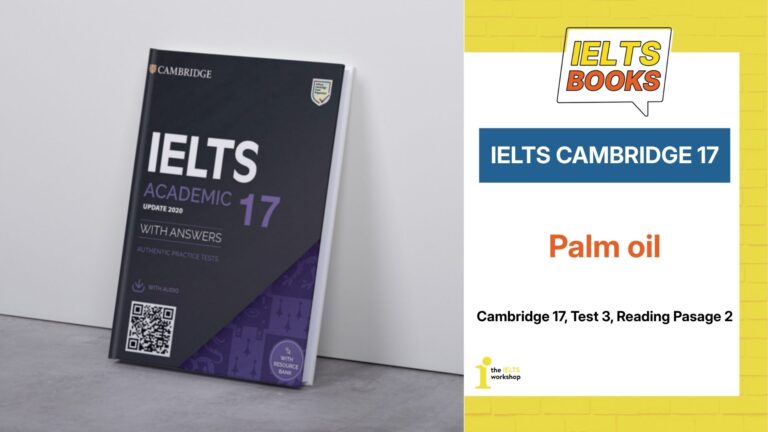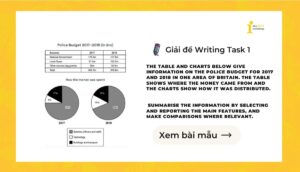IELTS Cambridge 17 Test 3 Reading Passage 2: Palm oil là một bài tập không quá khó nhưng vẫn đủ thử thách để luyện tập cho phần thi IELTS Reading. Để đạt hiệu quả cao khi làm bài, bạn nên đọc kĩ và ôn lại thật nhiều bạn nhé.
Đáp án IELTS Cambridge 17 Test 3 Reading Passage 2
| Câu hỏi | Đáp án |
| 14. | F |
| 15. | G |
| 16. | A |
| 17. | H |
| 18. | B |
| 19. | E |
| 20. | C |
| 21 & 22 | B & C |
| 23. | solid |
| 24. | Sumatran orangutan |
| 25. | carbon stocks |
| 26. | biodiversity |
Phân tích chi tiết đáp án IELTS Cambridge 17 Test 3 Reading Passage 2
Câu 14: Đáp án F
Câu hỏi: Examples of a range of potential environmental advantages of oil palm tree cultivation
Dịch: Ví dụ về một loạt các lợi thế môi trường tiềm năng của việc trồng cây cọ dầu
Vị trí: Đoạn F
Transcript: “…oil palm is four times more productive than rapeseed, and can be ten times more productive than soybean. This could mean using less land overall. Moreover, oil palm plantations can sequester more carbon than alternative crops…”
Phân tích: Đoạn này đề cập đến năng suất cao của cây cọ dầu so với cây khác, nghĩa là có thể tiết kiệm đất – một lợi thế sinh thái. Ngoài ra, cây này còn có khả năng giữ lại nhiều carbon hơn, giúp giảm biến đổi khí hậu.
Câu 15: Đáp án G
Câu hỏi: Description of an organisation which controls the environmental impact of palm oil production
Dịch: Mô tả một tổ chức kiểm soát ảnh hưởng môi trường của sản xuất dầu cọ
Vị trí: Đoạn G
Transcript: “…the Roundtable on Sustainable Palm Oil (RSPO) was set up… standards include no virgin forest clearing, transparency, and carbon stock assessments…”
Phân tích: RSPO là tổ chức đặt ra tiêu chuẩn để đảm bảo dầu cọ sản xuất thân thiện với môi trường, bao gồm không phá rừng, minh bạch và đánh giá trữ lượng carbon thường xuyên.
Câu 16: Đáp án A
Câu hỏi: Examples of the widespread global use of palm oil
Dịch: Những ví dụ về việc sử dụng dầu cọ trên toàn cầu
Vị trí: Đoạn A
Transcript: “Palm oil can be found in products ranging from soap to sandwiches and biscuits…”
Phân tích: Danh sách các sản phẩm sử dụng dầu cọ cho thấy sự phổ biến toàn cầu.
Câu 17: Đáp án H
Câu hỏi: Reference to a particular species which could benefit the ecosystem of oil palm plantations
Dịch: Nhắc đến một loài có thể mang lại lợi ích cho hệ sinh thái các đồn điền dầu cọ
Vị trí: Đoạn H
Transcript: “…the bird’s nest fern… providing shelter to various organisms like fungi, bacteria, invertebrates, amphibians…”
Phân tích: Dương xỉ tổ chim có thể góp phần làm tăng đa dạng sinh học trong các đồn điền dầu cọ.
Câu 18: Đáp án B
Câu hỏi: Figures illustrating the rapid expansion of the palm oil industry
Dịch: Các con số minh chứng cho sự mở rộng nhanh chóng của ngành dầu cọ
Vị trí: Đoạn B
Transcript: “…from six to 17 million hectares, now covering 10% of all cropland worldwide. Oil production rose from two to 60 million tonnes…”
Phân tích: Các con số này thể hiện sự phát triển nhanh chóng và quy mô lớn của ngành.
Câu 19: Đáp án E
Câu hỏi: An economic justification for not opposing the palm oil industry
Dịch: Một biện minh về mặt kinh tế cho việc không phản đối ngành công nghiệp dầu cọ
Vị trí: Đoạn E
Transcript: “…palm oil production has helped millions of people in developing countries escape poverty.”
Phân tích: Đây là lý do về mặt kinh tế để không phản đối ngành, vì nó giúp xóa đói giảm nghèo.
Câu 20: Đáp án C
Câu hỏi: Examples of creatures badly affected by the establishment of oil palm plantations
Dịch: Các sinh vật bị ảnh hưởng xấu do sự phát triển của đồn điền dầu cọ
Vị trí: Đoạn C
Transcript: “Endangered species – most famously the Sumatran orangutan, but also rhinos, elephants, tigers…”
Phân tích: Đoạn này liệt kê những loài bị ảnh hưởng tiêu cực bởi đồn điền dầu cọ.
Câu 21–22: Đáp án B & C
Câu hỏi: HAI tuyên bố đúng về RSPO
B: Đúng – yêu cầu sự minh bạch về hoạt động sản xuất
C: Đúng – mất khoảng một thập kỷ để thiết lập tiêu chuẩn
A, D, E: Không có thông tin cụ thể trong bài → Not Given
Câu 23: Đáp án – solid
Câu hỏi: One advantage of palm oil for manufacturers is that it stays ……….. even when not refrigerated.
Vị trí: Đoạn A
Thông tin: “…such as remaining solid at room temperature…”
Phân tích: Dầu cọ không bị chảy dù không để trong tủ lạnh, phù hợp để bảo quản thực phẩm.
Câu 24: Đáp án – Sumatran orangutan / orangutan
Câu hỏi: The……….. is the best known of the animals suffering habitat loss…
Vị trí: Đoạn C
Thông tin: “…most famously the Sumatran orangutan…”
Phân tích: Đây là loài điển hình nhất bị ảnh hưởng do mất môi trường sống.
Câu 25: Đáp án – carbon stocks
Câu hỏi: RSPO insists that growers check ……….. on a routine basis
Vị trí: Đoạn G
Thông tin: “…regular assessment of carbon stocks”
Phân tích: Kiểm tra lượng carbon là một trong những tiêu chí chứng nhận sản phẩm bền vững.
Câu 26: Đáp án – biodiversity
Câu hỏi: Ellwood and his researchers are looking into whether the bird’s nest fern could restore ……………
Vị trí: Đoạn H
Thông tin: “…could potentially allow these areas to recover their biodiversity…”
Phân tích: Nghiên cứu cho thấy dương xỉ tổ chim có thể phục hồi sự đa dạng sinh học ở các đồn điền.
Bản dịch chi tiết IELTS Cambridge 17, Test 3, Reading Passage 2
A.
Palm oil is an edible oil derived from the fruit of the African oil palm tree, and is currently the most consumed vegetable oil in the world. It’s almost certainly in the soap we wash with in the morning, the sandwich we have for lunch, and the biscuits we snack on during the day. Why is palm oil so attractive for manufacturers? (Q23) Primarily because its unique properties – such as remaining solid at room temperature – make it an ideal ingredient for long-term preservation, allowing many packaged foods on supermarket shelves to have ‘best before’ dates of months, even years, into the future.
Dầu cọ là một loại dầu ăn được chiết xuất từ quả của cây cọ dầu châu Phi, hiện nay là loại dầu thực vật được tiêu thụ nhiều nhất trên thế giới. Gần như chắc chắn nó có mặt trong xà phòng chúng ta dùng buổi sáng, bánh sandwich ăn trưa và cả bánh quy ăn vặt trong ngày. Tại sao dầu cọ lại hấp dẫn các nhà sản xuất đến vậy? Chủ yếu là vì những đặc tính riêng biệt – như giữ được trạng thái rắn ở nhiệt độ phòng – khiến nó trở thành một thành phần lý tưởng để bảo quản lâu dài, giúp các loại thực phẩm đóng gói trên kệ siêu thị có hạn sử dụng kéo dài hàng tháng, thậm chí hàng năm.
Từ vựng cần nhớ:
- edible (adj) /ˈedəbl/: có thể ăn được
- preservation (n): sự bảo quản
- solid (adj): rắn, cứng
B.
Many farmers have seized the opportunity to maximise the planting of oil palm trees. Between 1990 and 2012, the global land area devoted to growing oil palm trees grew from 6 to 17 million hectares, now accounting for around ten percent of total cropland in the entire world. From a mere two million tonnes of palm oil being produced annually globally 50 years ago, there are now around 60 million tonnes produced every single year, a figure looking likely to double or even triple by the middle of the century.
Nhiều nông dân đã nhanh chóng nắm bắt cơ hội để mở rộng tối đa diện tích trồng cây cọ dầu. Từ năm 1990 đến 2012, diện tích đất toàn cầu dành cho cây cọ dầu đã tăng từ 6 triệu lên 17 triệu héc-ta, hiện chiếm khoảng 10% tổng diện tích đất nông nghiệp trên thế giới. Cách đây 50 năm, chỉ có khoảng 2 triệu tấn dầu cọ được sản xuất mỗi năm, còn hiện tại con số này đã tăng lên khoảng 60 triệu tấn mỗi năm, và dự kiến sẽ tăng gấp đôi hoặc gấp ba vào giữa thế kỷ này.
Từ vựng cần nhớ:
- seize (v): nắm bắt
- hectare (n): héc-ta (đơn vị diện tích)
- devote (v): dành cho, cống hiến
- mere (adj): chỉ, vỏn vẹn
C.
However, there are multiple reasons why conservationists cite the rapid spread of oil palm plantations as a major concern. There are countless news stories of deforestation, habitat destruction and dwindling species populations, all as a direct result of land clearing to establish oil palm tree monoculture on an industrial scale, particularly in Malaysia and Indonesia. (Q24) Endangered species – most famously the Sumatran orangutan, but also rhinos, elephants, tigers, and numerous other fauna – have suffered from the unstoppable spread of oil palm plantations.
Tuy nhiên, có nhiều lý do khiến các nhà bảo tồn coi sự lan rộng nhanh chóng của các đồn điền cọ dầu là mối lo ngại lớn. Có vô số bài báo nói về tình trạng phá rừng, hủy hoại môi trường sống và số lượng các loài suy giảm – tất cả đều là hậu quả trực tiếp của việc phát quang đất để trồng độc canh cọ dầu trên quy mô công nghiệp, đặc biệt ở Malaysia và Indonesia. Các loài có nguy cơ tuyệt chủng – nổi bật nhất là đười ươi Sumatra, nhưng còn cả tê giác, voi, hổ và nhiều loài động vật khác – đã bị ảnh hưởng nặng nề bởi sự lan rộng không kiểm soát của các đồn điền này.
Từ vựng cần nhớ:
- dwindle (v) /ˈdwɪndl/: giảm dần
- monoculture (n) /ˈmɒnəkʌltʃə/: độc canh
- fauna (n) /ˈfɔːnə/: hệ động vật
D.
“Palm oil is surely one of the greatest threats to global biodiversity,’ declares Dr Farnon Ellwood of the University of the West of England, Bristol. ‘Palm oil is replacing rainforest, and rainforest is where all the species are. That’s a problem. This has led to some radical questions among environmentalists, such as whether consumers should try to boycott palm oil entirely.
Meanwhile Bhavani Shankar, Professor at London’s School of Oriental and African Studies, argues, ‘It’s easy to say that palm oil is the enemy and we should be against it. It makes for a more dramatic story, and it’s very intuitive. But given the complexity of the argument, I think a much more nuanced story is closer to the truth.’
“Dầu cọ chắc chắn là một trong những mối đe dọa lớn nhất đối với đa dạng sinh học toàn cầu,” Tiến sĩ Farnon Ellwood từ Đại học West of England, Bristol tuyên bố. “Dầu cọ đang thay thế rừng mưa nhiệt đới – nơi cư trú của hầu hết các loài sinh vật. Đó chính là vấn đề.” Điều này đã dẫn đến nhiều câu hỏi cấp tiến từ giới bảo vệ môi trường, như liệu người tiêu dùng có nên tẩy chay hoàn toàn dầu cọ hay không.
Trong khi đó, Bhavani Shankar – Giáo sư tại Trường Nghiên cứu Phương Đông và Châu Phi ở London – lập luận: “Nói rằng dầu cọ là kẻ thù và chúng ta nên chống lại nó thì rất dễ. Nó tạo ra một câu chuyện kịch tính và dễ hiểu. Nhưng xét đến sự phức tạp của vấn đề, tôi cho rằng một cách nhìn mang nhiều sắc thái sẽ gần với sự thật hơn.”
Từ vựng cần nhớ:
- boycott (v) /ˈbɔɪkɒt/: tẩy chay
- nuanced (adj) /ˈnjuːɑːnst/: nhiều sắc thái
- biodiversity (n): đa dạng sinh học
E.
Palm oil’s popularity has soared because it is highly versatile as a food product. For example, solid fats like butter or lard have traditionally been used to give baked goods like pastries and biscuits their crumbly texture. But these fats are high in saturated fat, which raises cholesterol and contributes to heart disease. Because palm oil is semi-solid at room temperature, it performs this role just as well, but with a better health profile. Palm oil is also odourless and colourless, meaning it doesn’t alter the taste or look of food products. And it is resistant to oxidation, giving products a longer shelf life.
Sự phổ biến của dầu cọ đã tăng vọt vì nó cực kỳ linh hoạt khi dùng trong thực phẩm. Ví dụ, các chất béo rắn như bơ hoặc mỡ lợn từ lâu đã được dùng để tạo kết cấu giòn vụn cho các món nướng như bánh ngọt và bánh quy. Tuy nhiên, những chất béo này có hàm lượng chất béo bão hòa cao, làm tăng cholesterol và góp phần gây bệnh tim. Trong khi đó, dầu cọ ở dạng bán rắn ở nhiệt độ phòng nên có thể thay thế vai trò này hiệu quả không kém, nhưng với lợi ích sức khỏe tốt hơn. Ngoài ra, dầu cọ không có mùi và không màu, nên không làm thay đổi hương vị hay màu sắc của thực phẩm. Và nó còn chống oxy hóa tốt, giúp thực phẩm có thời hạn sử dụng dài hơn.
Từ vựng cần nhớ:
- versatile (adj) /ˈvɜːsətaɪl/: đa năng, linh hoạt
- saturated fat (n): chất béo bão hòa
- oxidation (n) /ˌɒksɪˈdeɪʃn/: sự oxy hóa
- crumbly (adj) /ˈkrʌmbli/: dễ vỡ vụn
F.
Aside from its use in food, palm oil also has the highest yield of any oil crop – about four times the oil production per hectare than sunflower or rapeseed oil. This high yield means that growing oil palm trees is a very efficient use of land, a point raised by Alan Townsend, Professor of Environmental Studies at the University of Colorado. ‘Palm oil is very productive,’ he says. ‘If we were to try to replace it with other types of vegetable oil, we’d need more land, not less, and that could be even worse for the environment.’
Ngoài việc được dùng trong thực phẩm, dầu cọ còn có năng suất cao nhất trong số các loại cây lấy dầu – cho sản lượng dầu cao gấp khoảng 4 lần trên mỗi héc-ta so với dầu hướng dương hoặc dầu hạt cải. Năng suất cao này đồng nghĩa với việc trồng cây cọ dầu là một cách sử dụng đất rất hiệu quả – điều này được Giáo sư Alan Townsend, chuyên ngành Nghiên cứu Môi trường tại Đại học Colorado, đề cập đến. Ông nói: “Dầu cọ rất hiệu quả về năng suất. Nếu chúng ta cố gắng thay thế nó bằng các loại dầu thực vật khác, thì sẽ cần nhiều đất hơn, không phải ít hơn – và điều đó có thể còn gây hại hơn cho môi trường.”
Từ vựng cần nhớ:
- yield (n): sản lượng, năng suất
- hectare (n): héc-ta
- rapeseed (n): hạt cải dầu
- efficient (adj): hiệu quả
G.
Therefore, many argue that boycotting palm oil is not the solution. Instead, efforts should be focused on making its production more sustainable. Palm oil is a ‘crop with problems’, says environmental journalist Fred Pearce, ‘but it’s not a bad crop’. He explains, ‘If the world demands less palm oil, the danger is that it increases the demand for less land-efficient oils like soy, which would probably drive even greater levels of deforestation.’ Therefore, he says, ‘The goal should be to reform the industry, not to eliminate it.
Vì vậy, nhiều người cho rằng tẩy chay dầu cọ không phải là giải pháp. Thay vào đó, cần tập trung vào việc làm cho quy trình sản xuất dầu cọ bền vững hơn. Nhà báo môi trường Fred Pearce gọi dầu cọ là một “loại cây trồng có vấn đề” – nhưng không phải là một cây trồng tồi. Ông giải thích: “Nếu thế giới giảm nhu cầu với dầu cọ, thì nguy cơ là nhu cầu đối với các loại dầu kém hiệu quả hơn về mặt sử dụng đất – như dầu đậu nành – sẽ tăng lên, và điều đó có thể dẫn đến tình trạng phá rừng nghiêm trọng hơn nữa.” Vì vậy, ông kết luận: “Mục tiêu nên là cải cách ngành này, chứ không phải loại bỏ nó.”
Từ vựng cần nhớ:
- sustainable (adj): bền vững
- deforestation (n): nạn phá rừng
- eliminate (v): loại bỏ
- reform (v): cải cách
H.
More sustainable palm oil production is possible. For example, an increasing number of major palm oil producers are committing to zero-deforestation policies and using satellites to monitor their plantations. Some palm oil plantations are being used to grow other crops such as cocoa and coconuts among the oil palms, which can benefit both the environment and farmer incomes. Others are being set up on disused cattle pastures or previously deforested land, rather than cutting down more rainforest. There is also increasing pressure on big corporations to use sustainably produced palm oil in their products – some companies have even been forced to switch suppliers after consumer protests.
Việc sản xuất dầu cọ bền vững hơn là hoàn toàn khả thi. Ví dụ, ngày càng có nhiều nhà sản xuất dầu cọ lớn cam kết chính sách “không phá rừng” và sử dụng vệ tinh để giám sát các đồn điền của họ. Một số đồn điền dầu cọ còn được sử dụng để trồng xen canh các loại cây khác như ca cao và dừa – điều này vừa có lợi cho môi trường, vừa cải thiện thu nhập của nông dân. Một số đồn điền khác được thành lập trên các đồng cỏ nuôi gia súc bị bỏ hoang hoặc các khu vực từng bị chặt phá thay vì tiếp tục đốn hạ rừng nguyên sinh. Ngoài ra, áp lực từ người tiêu dùng đối với các tập đoàn lớn cũng ngày càng tăng, buộc họ phải sử dụng dầu cọ sản xuất bền vững – thậm chí một số công ty đã phải thay đổi nhà cung cấp sau khi bị phản đối.
Từ vựng cần nhớ:
- switch suppliers: thay đổi nhà cung cấp
- zero-deforestation policy: chính sách không phá rừng
- satellite (n): vệ tinh
- pasture (n) /ˈpɑːstʃə/: đồng cỏ chăn nuôi
Series giải đề IELTS Cambridge 17
- [PDF + Audio] Cambridge IELTS 17 – Cambridge Practice Tests For IELTS 17 With Answers
- Đáp án Cambridge 17 & lời giải chi tiết: Test 1 – Test 4
- IELTS Cambridge 17, Test 3, Listening Part 1: Advice on surfing holidays.
- IELTS Cambridge 17, Test 3, Listening Part 2: Childcare service.
- IELTS Cambridge 17, Test 3, Listening Part 3: Holly’s Work Placement Tutorial.
- IELTS Cambridge 17, Test 3, Listening Part 4: Bird Migration Theory.
- Giải chi tiết Cambridge 17 Reading Test 3:
- IELTS Cambridge 17, Test 3, Reading Passage 1: The thylacine.
- IELTS Cambridge 17, Test 3, Reading Passage 2: Palm oil.
- IELTS Cambridge 17, Test 3, Reading Passage 3: Building the Skyline: The Birth and Growth of Manhattan’s Skyscrapers.
- [PDF + Audio] Trọn bộ Cambridge Practice Tests For IELTS 1 – 20 mới nhất
Bạn có thể tham gia khóa HỌC IELTS MIỄN PHÍ cùng các giáo viên 9.0 tại Website The IELTS Workshop để nắm vững phương pháp học cũng như các kỹ năng làm bài thi IELTS từ thầy cô nhé!



![[PDF + Audio] Trọn bộ Cambridge Practice Tests For IELTS 1 – 20 mới nhất](https://onthiielts.com.vn/wp-content/uploads/2020/04/cam-1-14-764x400.jpg)
![[PDF + Audio] Cambridge IELTS 20: Cập nhật mới nhất (Bản đẹp)](https://onthiielts.com.vn/wp-content/uploads/2025/07/Cambridge-IELTS-20-300x169.jpg)




